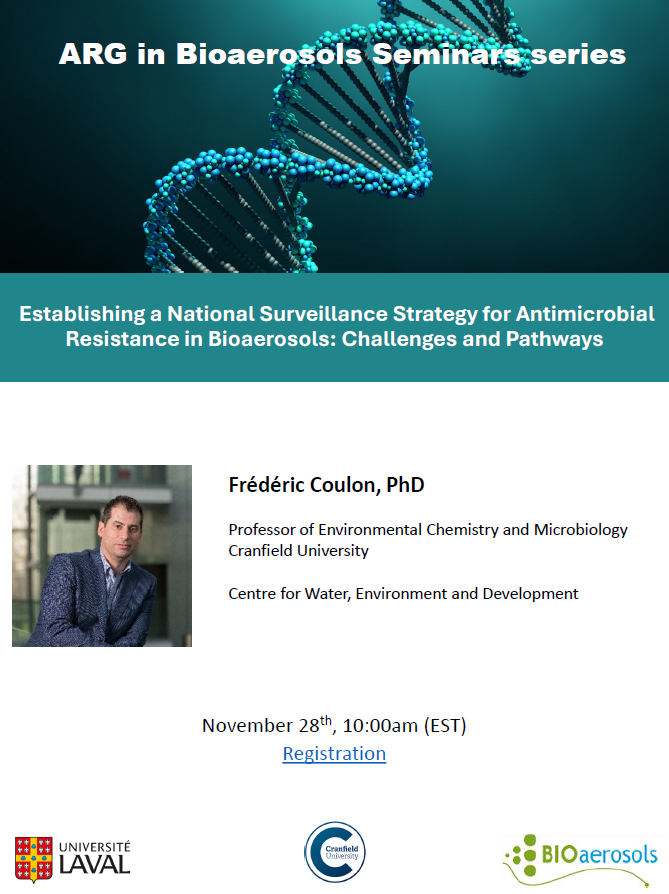Kick-off meeting (20 November 2023)


During world AMR Awareness Week, we had our first UK-Canada AMR project meeting and will contribute to EDAR 2024 at Montreal, Canada. This meeting included four interdisciplinary and interconnected themes, led by the corresponding investigators:
- Theme 1: Understanding AMR in managed agricultural environments Chairs: FredericCoulon (Cranfield) & Xin Zhao (McGill)
- Theme 2: Emerging and novel technologies for AMR detection and surveillance in agriculture environment Chair: Zhugen Yang (Cranfield)
- Theme 3: Human exposure and transmission risks Chair: Anne Leonard (Exeter)
- Theme 4: Mechanisms of transfer and risk mitigation measure Chairs: Andrew Singer (UKCEH) & Amir Sanati Nezhad (Calgary)
The meeting lasted for one day in hybrid mode, with members of UK team meeting in person at Cranfield University campus and Canadian team joining on-line. During lunch break, we also had a lab tour for water sensors lab in George Solt Building and took a photo together.
EDAR7 Workshop 7:New detection methods for AMR in managed agriculture and environment (29 May 2024)

During the 7th Environmental Dimension of Antimicrobial Resistance (EDAR) Conference, we had organised a workshop on new detection methods for AMR in managed agriculture and environment. This workshop aims to tackle these challenges by taking a transdisciplinary approach to understand the complexity and diversity of AMR sources, pathways, and receptors in managed agricultural environments, including biosensing, microfluidics, molecular method and big data, associated with the UK-Canada BBSRC funded project involved world-leading universities and institutes from both the UK and Canada as well as from other countries. Anglo-Canadian AMR project was introduced by Prof. Zhugen Yang at the beginning of the workshop, followed with four presentations and discussions:
- Presentation 1: New Detection Methods for AMR by Prof. Caroline Duchaine: Canada Research Chair on Bioaerosols
- Presentation 2: Nanobiotechnology Enabled Sensing by Prof. Peter Vikesland
- Presentation 3: GVA Technology by Mohamed Elfateh Salem
- Presentation 4: Low-Cost and Rapid Sensors for AMR Surveillance: One Health Perspective by Prof. Zhugen Yang
This workshop provides an opportunity to advance science in collaboration with global scientists and relevant stakeholders (e.g., policy makers) to aid in their understanding of AMR issues and novel technologies being developed to monitor AMR. This opportunity will allow EDAR to broaden their scientific knowledge (e.g., biosensing and microfluidic as an alternative monitoring method) to develop new methods and novel insights. It is expected that such workshop will lead to substantial new ideas to tackle critical research questions in the field of AMR and foster new international collaboration.
International Symposium on Microfluidics for Sensing and Sequencing (23 July 2024)


We have invited world-leading multidisciplinary experts to talk and discuss recent research progress on microfluidics for sensing (e.g. rapid and low-cost sensors) and sequencing, e.g. single-cell sequencing even for biomedical diagnostics, environmental and public health. The emerging technology could be potentially employed for wastewater surveillance for early warning of public health and pandemic preparedness, as well as providing useful tools to better understand the mechanism of the evolution and transmission of antibiotic resistance among plant, animal and human health, such as horizontal gene transfer and host-phage infection. Experts in AMR research, including Prof. Yong-Guan Zhu and Prof. Xin Zhao, attended this event and the extensive discussion. More details can be found via the link below:
ARG in Bioaerosols Seminars Series - Frédéric Coulon (28Nov , 2024 03:00 PM )

The presentation will outline the imperative need for a comprehensive national surveillance strategy to monitor antimicrobial resistance (AMR) in bioaerosols. Bioaerosols, which include airborne microorganisms, pose significant public health risks, particularly in urban and industrial environments where human exposure can lead to increased infection rates and compromised health outcomes.
Key topics that will be covered include:
• Global challenge of AMR, its impact on public health, and the specific relevance of bioaerosols in AMR transmission.
• Evaluation of existing monitoring efforts and gaps in data related to AMR in bioaerosols within the UK and internationally.
• Proposals for a national surveillance strategy, including methodologies for bioaerosol sampling, analysis techniques, and data integration.
• Importance of interdisciplinary collaboration among governmental bodies, academic institutions, and industry partners to establish effective monitoring frameworks.
• Discussion of the technical, regulatory, and logistical challenges in implementing a national strategy, along with potential solutions and innovations.
Create Your Own Website With Webador